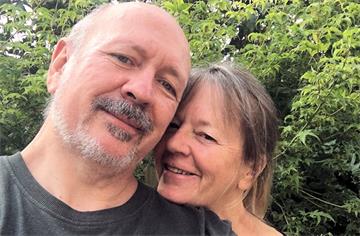MDS World Awareness Day - 25 October

Wednesday 25 October 2023 is MDS World Awareness Day.
Myelodysplastic Syndromes (MDS) are an often unrecognised, rare group of blood cancers caused by the failure of the bone marrow to produce enough healthy blood cells. They are also known as myelodysplastic neoplasms.
They can affect people of any age, but are most common in adults aged over 60. Around a third of people with MDS develop acute myeloid leukaemia (AML).
Geri's story
On 1 September 2023, Geraldine Hill celebrated the second anniversary of a life-saving stem cell transplant. She is full of praise for the care she received in these last two years, and told us how she is now in remission, despite medical staff fearing at one point that she had only days to live.
In March 2020, Geri was feeling run down, and her concerned GP referred her to the Churchill Hospital in Oxford, a Centre of Excellence for MDS treatment, where she received a diagnosis of MDS.
Despite the rapid onset of the COVID-19 pandemic, Geri recounts that she received wonderful support and practical advice from the staff at the Churchill, Consultant Dr Andy Peniket and his team, and charities Macmillan and Maggie's Oxford. She also encountered MDS UK, part of the global alliance which organises MDS World Awareness Day.
However, by the end of the year she had become very ill - severely neutropenic and with a serious abscess. She was admitted to hospital as an emergency multiple times and treated with strong antibiotics. When various treatments finally got her strong enough, she received the stem cell transplant in September 2021.
Initially all went well, and Geri was discharged after five weeks: but in March 2022, feeling weak, Geri attended hospital for routine blood tests and observations. She then remained in hospital for eight months with multiple, unidentified infections. She received a Donor Lymphocyte Infusion (DLI) which she was advised would take six to eight weeks to work - if at all.
Her condition went from bad to worse, and in June 2022 she was moved to Sobell House Hospice for palliative care. There was, apparently, nothing more that could be done, and her partner of 24 years and her family were told that she might live for only a few more days.
A beautiful hospice wedding in the sunlit rose garden was hastily organised by the nurses at Sobell House, and Geri's new husband Neil stayed by her side 24 hours a day.
Miraculously, after eight weeks Geri started to improve. She moved first to Rush Court, a care home in Wallingford, and by early November was back home.
She is still closely and continuously monitored by the Churchill team and needs ongoing physiotherapy to regain her strength and stamina, but, despite managing some other related conditions, she continues to improve and remains extremely well.
She feels it was an easy decision to choose to have the stem cell transplant, even though the odds of success, and thus of living, were only 55:45.
Geri says: "The dedication of the brilliant doctors and nurses at the Churchill and beyond who show such relentless scientific rigour and human empathy is astounding. I can't praise them enough.
"I am also writing anonymously to thank the selfless 20-year-old Polish man who donated his stem cells via the Anthony Nolan organisation.
"Finally, I have also had the love, prayers and support of friends and family - it's been truly humbling and I'm still in the process of thanking them.
"I feel now that I must do something to repay, in some way, this enormous gift I've been given."
Geraldine's mother has also very kindly made a donation to Oxford Hospitals Charity, as a thank you for the care her daughter received.
Geraldine says her mother is so grateful for everything the Churchill team did for her. The charity share their heartfelt thanks for this very kind gift.
You can find more information and sources of support on the MDS UK website.
Video: Myelo's Hope - MDS UK Patient Support Group
Pictured: Geraldine Hill, right, with her husband Neil.




























































